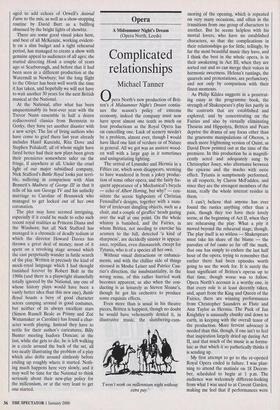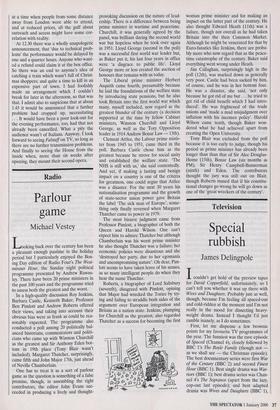Opera
A Midsummer Night's Dream (Opera North, Leeds)
Complicated relationships
Michael Tanner
Opera North's new production of Brit- ten's A Midsummer Night's Dream contin- ues the season's policy of extreme economy, indeed the company must now have spent almost one tenth as much on four productions as the Royal Opera has on cancelling one. Lack of scenery needn't be a problem, almost ever, though I would have liked one hint of verdure or of Nature in general. All we got was an austere wood- en wall with a large gap in it sometimes and uningratiating lighting.
The arrival of Lysander and Hermia in a Fifties car, which soon disappears, seeming to have wandered in from a jokey produc- tion of some other opera, and the fairly fre- quent appearance of a Mechanical's bicycle — echo of Albert Herring, but why? — con- stitute the scenic highpoints of Christian Fenouillat's designs, together with a num- ber of irrelevant dangling objects, such as a chair, and a couple of giraffes' heads gazing over the wall at one point. On the whole whimsy is banished, and the Fairies, in whom Britten, not needing to exercise his acumen to the full, detected 'a kind of sharpness', are decidedly sinister in appear- ance, reptilian, even dinosaurish, except for Tytania, who is of a species all her own.
Without visual distractions or enhance- ments, and with the chillier side of things stressed in Moshe Leiser and Patrice C,au- rier's direction, the insubstantiality, in the wrong sense, of this rather hurried work becomes apparent, as also when the con- ducting is as leisurely as Steven Sloane's, though he got his orchestra to produce some exquisite effects.
Even more than is usual in his theatre pieces, Britten is happiest, though no doubt he would have vehemently denied it, in illustrative music, the slumbering-cum- I won't work on millennium night without extra pay.' snoring of the opening, which is repeated on very many occasions, and often in the transitions from one group of characters to another. But he seems helpless with his mortal lovers, who have no established characters, so that the complications in their relationships go for little; tellingly, by far the most beautiful music they have, and I think the best in the whole opera, is in their awakening in Act III, when they are sorted out and so can merge their voices in harmonic sweetness. Helena's rantings, the quarrels and protestations, are perfunctory, and not only by comparison with their finest moments.
As Philip Kildea suggests in a penetrat- ing essay in the programme book, the strength of Shakespeare's play lies partly in the contrasts that are established and explored; and by concentrating on the Fairies and also by virtually eliminating Theseus and Hippolyta, Britten and Pears deprive the drama of any focus other than the gruesome manipulations of Oberon, a much more frightening version of Quint, as David Drew pointed out at the time of the premiere. In this production he is magnifi- cently acted and adequately sung by Christopher Josey, who alternates between the epicene and the macho with eerie effect. Tytania is sumptuously performed, in all respects, by Claron McFadden, and since they are the strongest members of the team, really the whole interest resides in them.
I can't, believe that anyone has ever found the rustics anything other than a pain, though they too have their lovely scene, at the beginning of Act II, when they are rehearsing the play. What a pity it moved beyond the rehearsal stage, though. The play itself is so witless — Shakespeare must take his share of the blame — the parodies of bel canto so far off the mark, that one has simply to endure the last half hour of the opera, trying to remember that earlier there had been episodes worth going to see the work for. It is surely the least significant of Britten's operas up to that time, though worse was to follow. Opera North's account is a worthy one, in that every role is at least decently taken, and, apart from the King and Queen of the Fairies, there are winning performances from Christopher Saunders as Flute and Ann Taylor as Hermia. The Puck of Jan Knightley is unusually chunky and down to earth, in keeping with the overall tenor of the production. More fervent advocacy is needed than this, though, if one isn't to feel that inspiration largely dried up during Act II, and that much of the music is as formu- laic as that which it so pathetically thinks it is sending up.
My first attempt to go to the re-opened Royal Opera ended in failure. I was plan- ning to attend the matinee on 18 Decem- ber, scheduled to begin at 1 p.m. The audience was welcomely different-looking from what I was used to at Covent Garden, making me feel that if performances were at a time when people from some distance away from London were able to attend, and at reduced prices, all the guff about outreach and access might have some cor- relation with reality.
At 12.30 there was a wholly unapologetic announcement, that 'due to technical prob- lems' the performance would be delayed by one and a quarter hours. Anyone who want- ed a refund could claim it at the box office. So there was an end to anyone's idea of catching a train which wasn't full of Christ- mas shoppers; and quite a time to kill in an expensive part of town. I had foolishly made an arrangement which I couldn't break for later in the afternoon, so that was that. I admit also to suspicions that at about 1.45 it would be announced that a further problem had cropped up, necessitating . . . It would have been a poor look-out for the evening performance, too, had that not already been cancelled. What a pity the audience wasn't of Italians. Anyway, I look forward to seeing Falstaff on TV, so long as there are no further transmission problems. And finally to seeing the House from the inside when, more than six weeks after opening, they mount their second opera.



















































 Previous page
Previous page